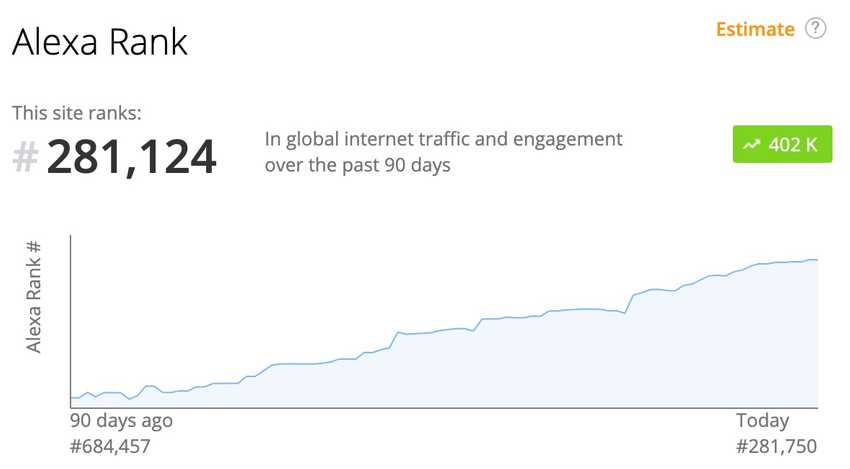What is bounce rate?
Bounce rate is the percentage of users that visit a webpage and leave again without interacting first, such as clicking, scrolling, or filling out a form. So if someone visits one of your pages and immediately click on the browser back button or close the browser tab without taking any action on your page, that counts as a bounce.
I recently discovered that TechStacker’s bounce rate is around 83%. At first, this was a shock to me, because I’ve gotten great feedback on it from several readers, and my Alexa Rank has skyrocketed ever since I started publishing every day.

TechStacker has improved its Alexa Rank over 400.000 positions over 90 days, yet my bounce rate is very high, what gives?
First of all, Alexa Rank is just an indicator of how much traffic a website gets. To my understanding, it doesn’t care about whether users engage with the site.
Secondly, according to Custom Media Labs it’s normal for a blog to average a 65% to 90% bounce rate. I’m still not happy with 83% though, and I’m working hard on improving it!
With e-commerce and retail websites it’s a lot different. Here the average bounce rate is 20% to 45% — according to Custom Media Labs.
Why do users bounce?
The reason people leave a page without interacting is either because they got what they wanted right away or because they immediately know that this particular page doesn’t solve their problem (but that doesn’t mean it won’t help other visitors).
Sometimes you can find what you’re looking for within the first paragraph on a page, such as when you look up words in an online dictionary, or a short recipe. Absorbing that type of quick information doesn’t require users to interact with the page, so that would still count as a bounce, even if the user got what they came for.
Another more serious reason users bounce could be that you have one or several 404 pages, which immediately causes most users to abandon ship right away.
404 is a server message you get in your browser when content is no longer available at a given URL.
If you have a big website, chances are at some point you’ll forget to update a URL or slug, and that will lead to 404 errors and a spike in bounce rates.
You can use a free tool like SEO Minion to quickly discover broken links on your website. I run that app through my website at least once per month.
How do you decrease your bounce rate?
To decrease your bounce rate, for any type of site, you need to give people a reason to stick around, even if they find what they were looking for immediately, such as the aforementioned dictionary or short recipe examples.
Better UX: navigation, search, and filters
One way to decrease your bounce rate is to improve your website’s overall UX (user experience), e.g. by making it easier to navigate your website. Such as having an easily accessible menu, and perhaps an intelligent search function and some filters to quickly sort through different types of content.
This would also encourage users who experience the aforementioned 404 errors to try their luck with your internal site search function, which (if it’s any good) should be able to find a working URL for the content they originally came for.
Embedded videos can massively decrease bounce rate
According to the video hosting company, Wistia, by embedding videos on their pages, their users more than doubled the average time they spent on those pages.
That makes sense. Videos are often more captivating and stimulating than text-based articles. Just seeing an embedded video on a page can make you want to click the play button — especially if the thumbnail is appealing, and the runtime is short (like less than 2 minutes).
Does a high bounce rate affect ranking negatively?
Does having a high bounce rate negatively affect your overall SEO? You’d think so, right? However, if you think about it logically, it wouldn’t make sense if search engines like Google punished a website for having a high bounce rate since it’s hard for to them know:
- if people bounced because they didn’t find what they came for.
- or if they bounced because they found what they came for immediately and therefore had no reason to interact with the page.
I’ve seen no clear data suggesting that a high bounce rate directly hurts your search ranking, but it might hurt your income, and that’s a good reason to work on decreasing it immediately.
In summary
As you can tell, bounce rate is not black and white. Having a high bounce rate doesn’t necessarily mean that your content sucks (it could). It depends a lot on the target audience/market you’re catering to.
- If you any type of quick information page, a high bounce rate is not necessarily a bad thing, in fact, it could be a good thing.
- If you have an e-commerce website, a high bounce rate means that users either can’t find the products they’re looking for or can’t be bothered to go through the checkout to order them (or both). This is bad.
Context is everything.